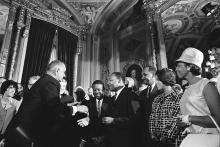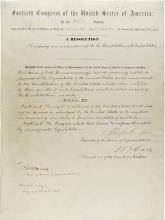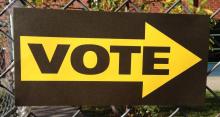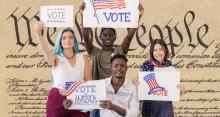Voting Rights Act of 1965

The Voting Rights Act of 1965 was passed August 6, 1965.

The Voting Rights Act of 1965 was passed August 6, 1965.

Passed by Congress on February 26, 1869, and ratified on February 3, 1870, the 15th Amendment granted African American men the right to vote.

Throughout the United States, the legacy of voter suppression continues, casting a daunting challenge to the fundamental right to vote. While considerable progress has been made in the fight for equal voting rights, one harsh reality remains: Black and minority voters are still disproportionately affected by a range of voter suppression tactics.

Voting is an important right and privilege in the United States of America. Although voting is not mandatory, I believe there is a moral obligation to participate in elections at all levels of government, from local to national.

U.S. election laws date back to Article 1 of the Constitution which outlines the structure of America's federal government. It also guarantees the states and people certain rights. Many constitutional amendments and federal laws have passed to help protect the right to vote and to make it easier for citizens to exercise that right.
"No right is more precious in a free country than that of having a voice in the election of those who make the laws under which, as good citizens, we must live. Other rights, even the most basic, are illusory if the right to vote is undermined." ~Justice Hugo Black, Wesberry v. Sanders, 376 U.S. 1,17 (1964)

The January 6th hearings in the House of Representatives exposed attempts by Donald Trump to subvert the Constitutional system used to elect presidents. Neither President Trump and his co-conspirators nor the people who ensured the non-violent transfer of power to President Biden were driven by a commitment to democracy. Trump was unsuccessful because people were loyal to the Constitution.
A commitment to the Constitution as it stands with an equal commitment to changing the Constitution when it is not fulfilling the values of democracy is the path to creating a multi-cultural nation that is not based on racism.